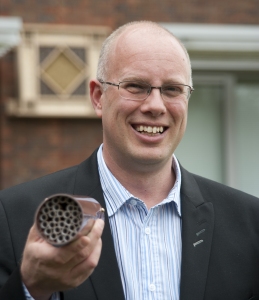Biodiversity loss among bees and wild flowers slows
Release Date 22 May 2013

Declines in the biodiversity of pollinating insects and wild plants have slowed in recent years, according to a new study published today.
Researchers, including scientists at the University of Reading, found evidence of dramatic reductions in the diversity of species in Britain, Belgium and the Netherlands between the 1950s and 1980s.
But the picture brightened markedly after 1990, with a slowdown in local and national biodiversity losses among bees, hoverflies and wild plants.
Professor Simon Potts, professor of biodiversity and ecosystem services at the University of Reading, was a co-author of the study. He said: "This latest research is evidence of some of the successes in Britain and elsewhere in Europe in conservation programmes preventing the decline of pollinator species. It also shows there is still much to do.
"By working together, scientists, farmers, governments and the public can all help to improve our natural environment. Apart from preserving our natural capital for future generations, helping insect pollinators is good for business. Research at Reading has shown wild pollinators do £1.8bn worth of pollinating work a year in the UK, every year, for free."
The latest research work was led by the University of Leeds and the Naturalis Biodiversity Centre in the Netherlands.
The study, published in the journal Ecology Letters, found a 30 per cent fall in local bumblebee biodiversity in all three countries between the 1950s and the 1980s. However, that decline slowed to an estimated 10 per cent in Britain by 2010, while in Belgium and the Netherlands bumblebee diversity had stabilised.
The picture was better for other wild bees, with an 8 per cent reduction in diversity in the Netherlands and a stable picture in Great Britain turning into significant increases (7 per cent in the Netherlands and 10 per cent in Britain) over the past 20 years. While these solitary bees continued to decline in Belgium, hoverfly diversity improved there, shifting from stable diversity in the 1980s to significant (20 per cent) increases in recent decades. British wildflower diversity had declined about 20 per cent from the 1950s to the 1980s, but again the declines have ceased in the past 20 years.
Not all groups fared so well. Butterfly diversity continued to fall in all three countries at roughly the same rates as in the past.
Dr Luisa Carvalheiro, lead author on the paper, said: "It is possible that by 1990 the most sensitive species had already gone. However, that's probably not the whole story, as there are still plenty of rare and vulnerable species present in recent records.
"There is a much more encouraging possibility: the conservation work and agri-environment programs paying farmers to encourage biodiversity may be having an effect. We may also be seeing a slowdown of the drivers of decline. The postwar emphasis on getting land into production and on more intensive farming has given way to a more stable situation in which the rate of landscape change has slowed and in which agrichemical excesses are regulated.
"If what we take from the Rio targets is that the investment in conservation gave us no results, then that is a counsel of despair. This study brings a positive message for conservation. But some important groups are undoubtedly still declining, so continued and increased investment in conservation practices is essential for guaranteeing the persistence of a diverse assemblage of species."
ENDS
For more information contact Pete Castle at the University of Reading press office on 0118 378 7391 or p.castle@reading.ac.uk.
Notes to editors:
Images of bees, butterflies and hoverflies species recorded in the study are available on request.
The full paper: Luísa G. Carvalheiro, et al. ‘Species richness declines and biotic homogenization have slowed down for NW-European pollinators and plants'. Ecology Letters, doi: 10.1111/ele.12121 is published in Ecology Letters on May 22. It is available on request.
The research team included scientists from 18 institutions in Europe and the United States, used historical and contemporary records of species' presence held by organisations including the European Invertebrate Survey, Butterfly Conservation, the Bees Wasps and Ants Recording Society, the INBO Research Institute for Nature and Forest in Belgium and the University of Mons, Belgium.
The study is published in Ecology Letters on Wednesday, May 22, 2013. This is the 21st anniversary of the signing of the Convention on Biological Diversity and has been designated by the United Nations as International Day for Biological Diversity.
The research was funded under the European Union Framework Program 7 projects Status and Trends of European Pollinators (STEP) (http://www.step-project.net/) and Securing the Conservation of biodiversity across Administrative Levels and spatial, temporal, and Ecological Scales (SCALES) (www.scales-project.net), with additional support from the UK Insect Pollinators Initiative.
The University of Reading is ranked among the top 1% of universities worldwide (THE World University Rankings).
